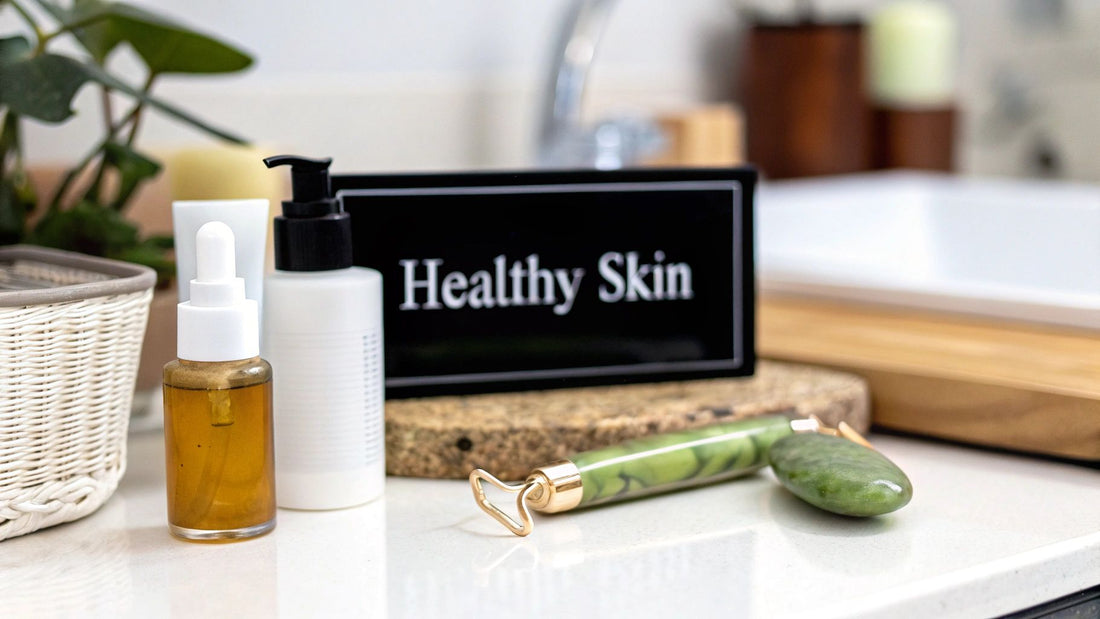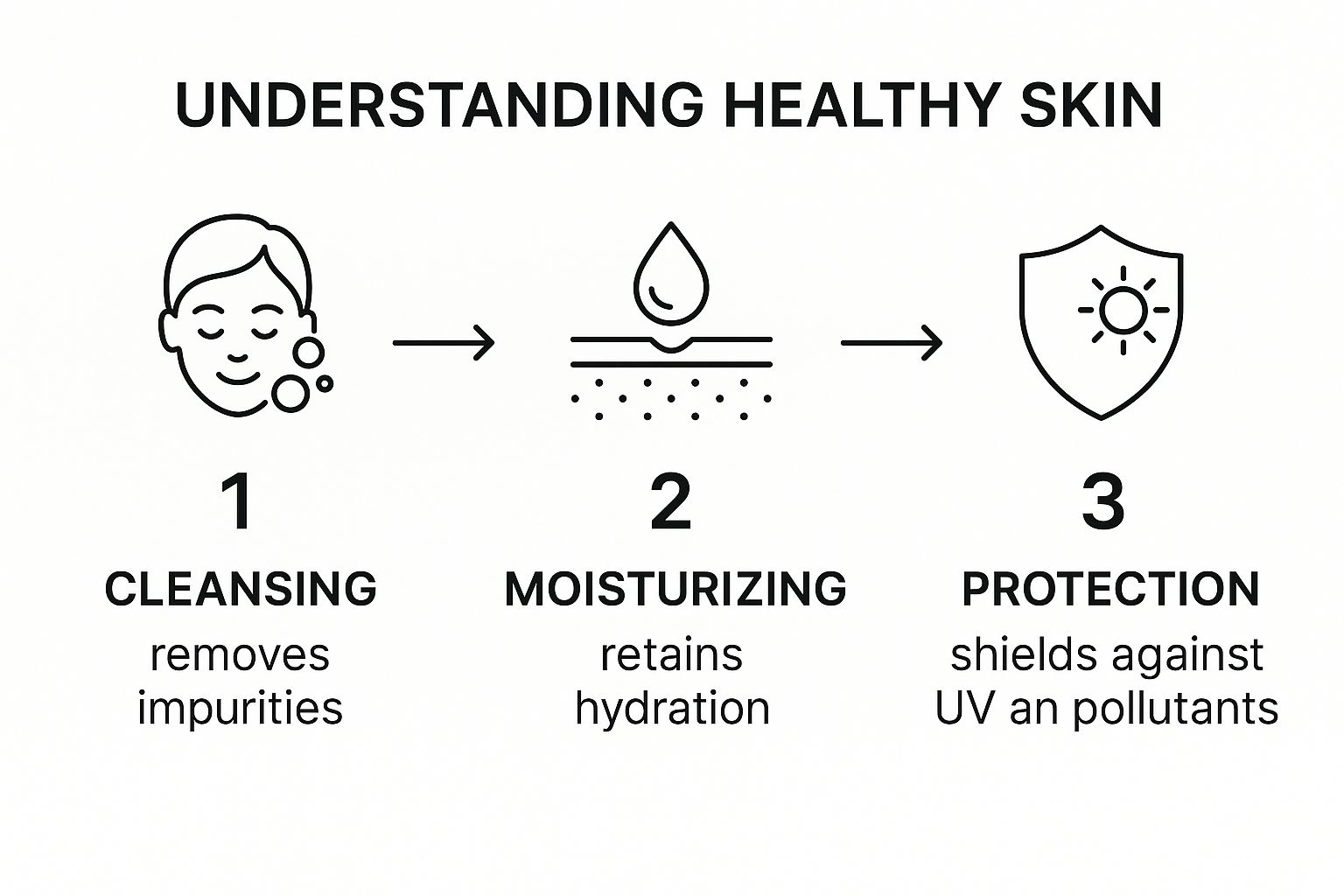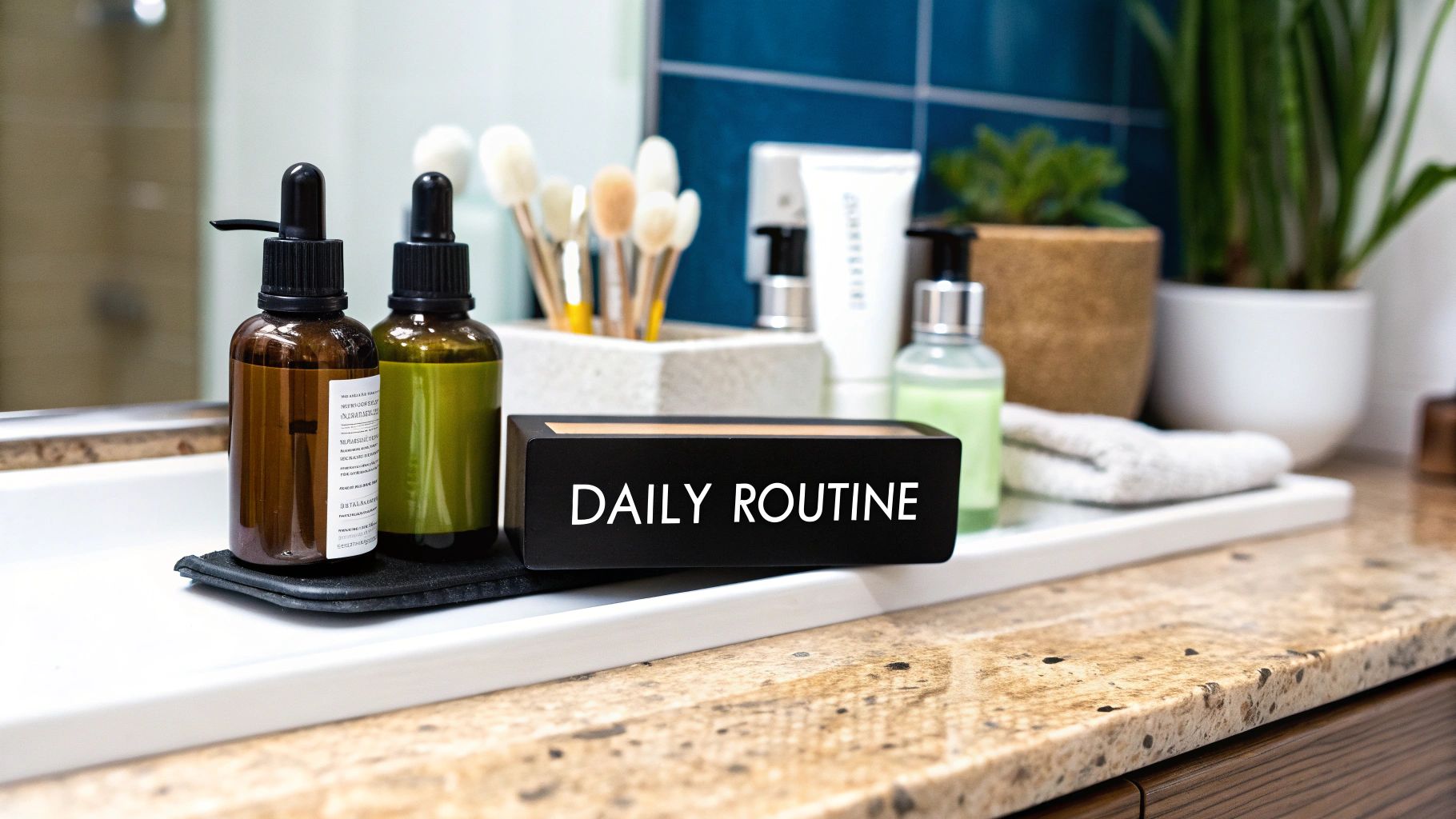
How to Achieve Healthy Skin: Your Complete Guide
Share
So, what's the secret to getting healthy, happy skin? It all boils down to a simple yet powerful framework: cleanse, treat, moisturise, and protect. This isn't about a bathroom counter cluttered with products; it's about a straightforward, consistent system that you can tailor to your skin's unique needs.
Your Blueprint for a Healthy Skin Routine
Let's cut through the noise. Forget those intimidating 12-step routines you see online that are almost impossible to stick with. The truth is, achieving genuinely healthy skin is all about consistency, not complexity. The core principles work for everyone, whether you're tackling breakouts, battling dryness, or noticing the first signs of ageing.
Think of it like building a house. You wouldn't start putting up walls without a solid foundation, right? The same logic applies to your skin. That foundation rests on four essential pillars, each one working in harmony with the others to keep your skin balanced, hydrated, and shielded from daily stressors.
This simple image below captures the essence of a solid routine, showing how each step logically follows the next to build healthier skin over time.

As you can see, it’s a synergistic process. Each step prepares your skin for the next, creating a combined effect that boosts its overall health and resilience.
The Four Pillars of Healthy Skin
To really get a grip on how to achieve glowing skin, let’s break down these pillars. Once you master these fundamentals, you’ll have a solid base for any routine you build.
- Cleansing: This is so much more than just a quick wash. A good cleanse gets rid of makeup, daily grime, excess oil, and pollutants without disrupting your skin's delicate moisture barrier.
- Treating: This is your chance to get personal. Using targeted products like serums allows you to address what your skin really needs—whether that’s vitamin C for a bit of brightness or hyaluronic acid for a serious hydration boost.
- Moisturising: Well-hydrated skin is strong skin, simple as that. A daily moisturiser is crucial for locking in all that goodness, supporting your skin barrier, and preventing moisture from escaping throughout the day.
- Protecting: This one is non-negotiable. Daily sun protection is your best friend, even on those notoriously cloudy UK days. Sunscreen is, without a doubt, your most powerful tool against premature ageing and sun damage.
This isn't just expert advice; it's a trend reflected across the UK. People are more invested than ever in their daily skincare, with market data showing a real appetite for personalised products. Multi-step routines built around cleansing, moisturising, and SPF are fast becoming the norm.
To get a clearer picture of these foundational steps, here’s a quick summary of the four pillars that every effective skincare routine is built on.
The Four Pillars of a Healthy Skin Routine
This table outlines the essential daily and weekly actions for maintaining healthy skin, forming the foundation of any effective skincare regimen.
| Pillar | Primary Goal | Frequency | Key Products |
|---|---|---|---|
| Cleansing | Remove impurities without stripping skin | Daily (AM & PM) | Gentle Cleanser, Micellar Water |
| Treating | Address specific concerns like ageing or acne | Daily (AM or PM) | Serums (e.g., Vitamin C, Retinol) |
| Moisturising | Hydrate and protect the skin barrier | Daily (AM & PM) | Moisturiser, Face Oil |
| Protecting | Prevent sun damage and premature ageing | Daily (AM) | Broad-Spectrum SPF 30+ |
Mastering these four pillars is the key to unlocking your skin's potential. It gives you a reliable framework you can always come back to.
The secret to great skin isn't some elusive "miracle" product. It's about creating a consistent, supportive environment where your skin can thrive. A simple, well-executed routine will always outperform a complicated one you can't stick to.
With this foundational knowledge, you're now perfectly equipped to build a routine that truly works for you. To see exactly how these principles come together, have a look at our complete guide on the ultimate skincare routine for radiant, healthy skin.
Choosing the Right Skincare Products

Walking down the skincare aisle can feel overwhelming, but building an effective routine doesn't require dozens of different products. The goal is to select a few core skincare products that are well-formulated and suited to your specific skin type and concerns.
The Essential Cleanser
Every great routine starts with a really good cleanse. You’re looking for a workhorse that can shift makeup, daily grime, and excess oil without leaving your skin feeling tight or stripped. A cleanser that’s too harsh will disrupt your skin's natural barrier, leading to irritation and dehydration.
For example, if your skin is oily, a gentle foaming gel is fantastic for removing excess sebum. On the other hand, someone with dry or sensitive skin will likely prefer a cream or milk-based cleanser that feels more comforting and hydrating.
Your Daily Moisturiser
Once your skin is clean, it's time for a moisturiser. Its main job is to hydrate your skin and protect its delicate barrier. Achieving healthy skin is nearly impossible without this step, as hydrated skin functions better and looks far more radiant.
The secret to picking the right one is understanding what your skin needs:
- For Oily or Acne-Prone Skin: Look for lightweight, non-comedogenic lotions or gels that provide hydration without clogging pores or feeling greasy.
- For Dry Skin: Opt for richer creams containing ingredients like ceramides, shea butter, and hyaluronic acid to restore lipids and lock in moisture.
- For Combination Skin: You may need a strategic approach, using a lightweight lotion on your T-zone and a richer cream on drier areas like your cheeks.
Think of your moisturiser as a bodyguard for your skin. It seals in the beneficial ingredients from your other products and protects against environmental stressors.
The Power of Targeted Serums
Serums are where you can truly personalise your routine to tackle specific skin goals. These are concentrated liquids with active ingredients that penetrate deeper into the skin than a moisturiser. They are your secret weapon for addressing everything from dullness to fine lines.
- Vitamin C: A powerful antioxidant, a Vitamin C serum is fantastic for brightening a tired-looking complexion, evening out skin tone, and protecting against environmental damage.
- Hyaluronic Acid: If dehydration is your main concern, a serum with hyaluronic acid is a game-changer. It can hold up to 1,000 times its weight in water, drawing moisture into the skin for a plump, dewy look.
- Niacinamide (Vitamin B3): This is a true multi-tasker, excellent for calming redness, minimising the appearance of pores, balancing oil production, and strengthening the skin barrier.
A great rule of thumb is to apply skincare products from the thinnest to the thickest consistency. So, a watery serum goes on first, followed by your creamier moisturiser, and then a facial oil or sunscreen. This layering technique ensures each product can be properly absorbed.
When you're starting out, introduce just one new serum at a time. Apply a few drops after cleansing but before moisturising. This allows you to see how your skin reacts and helps you identify which products are making a real difference.
Why Sun Protection is Your Skin's Best Friend

If you take only one thing away from this guide, let it be this: wearing sunscreen every single day is the most important thing you can do for your skin. It’s your ultimate defence against premature ageing, dark spots, and most importantly, skin cancer. And yes, that includes those classic grey, overcast UK days.
The sun’s rays come in a few flavours, but for skincare, we’re mainly concerned with UVA and UVB. An easy way I've always remembered it is UVA for Ageing and UVB for Burning. UVA rays are the sneaky ones; they penetrate deep into the skin, causing a breakdown of collagen that leads to wrinkles. UVB rays are what cause that painful, red sunburn.
This is why just grabbing a bottle with a high SPF number isn’t the full picture. You need to hunt for the words 'broad-spectrum' on the packaging. That little phrase is your guarantee that the product shields you from both types of damaging rays.
Finding a Sunscreen You’ll Actually Want to Wear
Let's be honest, the biggest reason people skip sunscreen is because they hate the feel of it. We've all been there—thick, greasy formulas that leave a ghostly white cast or make your foundation slide right off. The good news? Sunscreen technology has improved dramatically.
Today's formulas are a world away from the chalky creams of the past. Many feel more like luxurious moisturisers.
- For Oily or Blemish-Prone Skin: I always recommend looking for gel-creams or fluid textures that are labelled 'non-comedogenic'. This simply means they're designed not to clog your pores. They sink in fast, leave a matte finish, and work brilliantly as a makeup primer.
- For Dry or Sensitive Skin: Mineral sunscreens, which use zinc oxide or titanium dioxide, are often your best bet as they tend to be much gentler on the skin. Many newer formulas even include hydrating ingredients like hyaluronic acid to soothe and protect at the same time.
It’s impossible to overstate how vital this daily habit is. In the UK, an estimated 86% of melanoma cases are entirely preventable. Yet, a shocking 49% of us admit to getting sunburnt at least once a year. While survival rates are high with early diagnosis, preventing it in the first place is clearly the smartest move. For more information, you can find detailed statistics on skin cancer prevention at Cancer Research UK.
How to Apply It Like a Pro
Choosing the right product is half the battle; applying it correctly is the other. Believe me, almost everyone I speak to uses far too little, which seriously compromises the protection you think you're getting.
My go-to tip for getting it right is the 'two-finger' rule. Squeeze two full lines of sunscreen, one along your index finger and one along your middle finger. That’s the perfect amount for your face and neck to get the full SPF promised on the bottle.
Always apply it as the final step in your morning routine, right after your moisturiser and just before makeup. And yes, you really do need to reapply. If you’re spending a lot of time outdoors, top up every two hours—or more frequently if you’ve been swimming or sweating.
Making sun protection a non-negotiable part of your daily ritual is the single best investment you can make for your skin's future health.
Lifestyle Habits That Transform Your Skin

While the right products are a huge part of the puzzle, truly healthy skin is built from the inside out. Your daily habits are often just as powerful as the serums you apply, directly influencing your skin's health, radiance, and resilience.
Think of it this way: your skincare routine is what you do to your skin, but your lifestyle is what you do for your skin. Making a few simple changes to your daily life can amplify the effects of your products, leading to much more profound and lasting results.
Feed Your Skin From The Inside Out
The old saying "you are what you eat" has never been more true than when it comes to your complexion. A diet packed with certain nutrients provides the essential building blocks for healthy skin, helping to fight inflammation, boost collagen, and protect against daily environmental damage.
A few food groups are particularly brilliant for achieving that natural glow:
- Antioxidant-Rich Foods: Think berries, leafy greens like spinach, and other colourful vegetables. They are loaded with antioxidants that neutralise free radicals – those nasty unstable molecules that damage skin cells and speed up the ageing process.
- Healthy Fats: Foods like avocados, nuts, seeds, and oily fish (salmon is a classic) are rich in omega-3 fatty acids. These fats are absolutely crucial for maintaining a strong skin barrier, which is what keeps your skin hydrated and supple.
The Critical Roles of Sleep and Stress
Ever noticed your skin looks dull or you’ve had a breakout after a few nights of poor sleep? That’s no coincidence. When you're in a deep sleep, your body kicks into repair mode. It increases blood flow to the skin and gets to work rebuilding its collagen and elastin.
Chronic sleep deprivation can lead to higher levels of the stress hormone cortisol, which can trigger inflammation and make conditions like acne and eczema much worse. Aiming for 7-9 hours of quality sleep per night isn't just a luxury; it's a non-negotiable part of any good skin health strategy.
In the same way, chronic stress can wreak havoc on your complexion by keeping those cortisol levels consistently high. This can lead to more oil production, breakouts, and even a breakdown of the structures that keep your skin firm. Finding healthy ways to manage your stress—whether it's through exercise, mindfulness, or just a hobby you love—will pay dividends for your skin.
Don't Underestimate Hydration
Proper hydration is the foundation of good skin health. It's what keeps your skin plump, elastic, and functioning as it should. When skin is dehydrated, it often looks dull and fine lines can appear much more prominent.
Drinking plenty of water throughout the day is key. For a deeper dive, you can learn more about how hydration is the secret to youthful skin in our detailed guide. By weaving these simple lifestyle adjustments into your daily life—eating well, sleeping deeply, managing stress, and staying hydrated—you create the perfect internal environment for your skin to truly thrive.
Adapting Your Skincare to Your Environment
Your skin’s needs are far from static; they’re constantly changing with the world around you. The routine that gives you a perfect glow in the middle of a humid summer will likely leave your skin feeling parched and unhappy during a dry, cold winter. The secret to consistently healthy skin isn't finding one magic routine, but learning how to tweak it based on the day-to-day challenges you face.
Think about it: whether you're sitting in a centrally heated office all day, walking through a polluted city, or working a physically demanding job, your environment is directly impacting your skin. Learning to listen to what your skin is telling you and responding accordingly is how you build a truly resilient, healthy complexion.
Dealing with Indoor Environments
Most of us spend a huge chunk of our time indoors, where central heating and air conditioning can be real enemies of hydrated skin. These systems are designed to pull moisture from the air, and unfortunately, they do the same thing to your skin. The result? That tight, dry, and dull feeling we all dread.
To fight back, your game plan should be all about boosting hydration and reinforcing your skin's protective barrier.
- Layer your hydrators: Try applying a serum with hyaluronic acid before your moisturiser. It acts like a little moisture magnet, pulling hydration deep into the skin.
- Switch to a richer moisturiser: If your usual lightweight lotion just isn't cutting it, it might be time to upgrade to a cream. Look for one with ceramides to help lock in moisture and strengthen that skin barrier.
- Bring in a humidifier: Popping a small humidifier on your desk can make a world of difference. It puts much-needed moisture back into your personal space, giving your skin a break.
Here's a simple trick I swear by: keep a hydrating facial mist on your desk. A quick spritz during the day offers an instant burst of moisture and feels incredibly refreshing, helping to offset the dry office air.
Protecting Skin in Urban and Work Settings
If you're a city dweller, you're dealing with a daily barrage of airborne pollutants. Things like dust and exhaust fumes create free radicals on the skin's surface, which can speed up ageing and cause inflammation. Using an antioxidant serum in the morning—something with Vitamin C is perfect—helps to neutralise this damage before it can cause problems.
This need for protection is even more critical in certain jobs. According to the UK Health and Safety Executive, work-related skin diseases are a significant problem for the UK workforce, with dermatitis being a huge issue for anyone who has to wash their hands frequently or handle chemicals. For these roles, using barrier creams, wearing the right gloves, and moisturising relentlessly isn't just good advice—it's essential for keeping skin healthy.
Making these small, smart adjustments isn’t about adding a dozen new steps. It's about being proactive and ensuring your skin's barrier is strong enough to handle whatever your day throws at it.
Your Healthy Skin Questions, Answered
When you're trying to figure out your skin, it's natural to have a lot of questions. Let's get straight to the point and answer some of the most common ones I hear, so you can feel confident about your routine.
How Long Until I Actually See Results?
This is probably the number one question people ask. You're putting in the effort, so when does the payoff come?
While your skin might feel more hydrated within a day or two, bigger changes take time. You really need to give it at least 28-40 days to see a noticeable difference. That’s how long it takes for your skin to go through a full renewal cycle. Be patient—good things are happening, even if you can't see them immediately.
If I Could Only Use One Product, What Should It Be?
If you had to strip your routine back to a single, essential item, what would it be? For me, and for any skincare expert, the answer is always the same.
Sunscreen. A broad-spectrum SPF 30 (or higher) is non-negotiable. It's your best defence against premature ageing, dark spots, and most critically, skin cancer. If you do nothing else for your skin, make wearing sunscreen a daily habit.
Do I Need to Spend a Fortune on Skincare?
It's a common misconception that expensive means better, but that's rarely the case in skincare.
Absolutely not. A product's effectiveness comes down to its formulation and ingredients, not its price. Plenty of brilliant, affordable brands offer products packed with powerhouse ingredients like ceramides, hyaluronic acid, and niacinamide. Focus on what’s inside the bottle, not the fancy label.
Finally, what about when things aren't going so smoothly? If you're struggling with bumpy skin or breakouts that just won't quit, it's usually a sign that your routine needs a tweak. Introducing a gentle, consistent exfoliant can make a world of difference. To really get into the details, you can learn how to improve skin texture in our complete guide.
Understanding these key points helps you sidestep the confusion and build a routine that truly works for your skin’s long-term health.
Ready to build a routine that truly nurtures your skin? Discover targeted, science-backed solutions at P-Eleven and start your journey to a radiant complexion today. Explore our curated collections at https://p-eleven.com.


